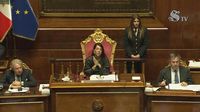On Thursday, March 20, 2025, a significant political incident unfolded in the Italian Senate when Vice President Licia Ronzulli was caught on a hot mic dismissively commenting on fellow senator Matteo Renzi. While presiding over a contentious session, Ronzulli was recorded saying, "Non me ne frega un ca... di quello che pensa Renzi" (I don't give a damn about what Renzi thinks). This off-the-cuff remark created a stir among attendees and observers alike, enhancing the already heightened tensions surrounding the day’s agenda, which included discussions on artificial intelligence regulations.
The moment, unintentional yet revealing, quickly propagated through social media, prompting immediate reactions from Renzi and others. In her haste to correct herself after seemingly realizing her microphone was still on, Ronzulli attempted to soften her statement, adding, "Sì, sì, non mi interessa quello che pensa il senatore Renzi" (Yes, yes, I don't care what Senator Renzi thinks). Nevertheless, the damage had been done. Raffaella Paita, a senator from Italia Viva, swiftly criticized Ronzulli's language. She stated, "È questo il linguaggio con cui la vicepresidente del Senato Licia Ronzulli (Forza Italia) si rivolge a un leader dell’opposizione. Al tempo delle influencer ormai il Senato è il bar dello sport di persone mediocri e volgari. Ronzulli chiederà scusa o dirà ancora ‘Me Ne Frego?’" (Is this the language the Vice President of the Senate Licia Ronzulli uses to address an opposition leader? At the time of influencers, the Senate is now the sports bar of mediocre and vulgar people. Will Ronzulli apologize or still say 'I don’t care?').
Renzi, another figure in the drama, replied to the incident via social media, mocking the state of political decorum. He quipped, "Ecco l’eleganza, lo stile, il rispetto istituzionale delle influencer della destra" (Here’s the elegance, style, and institutional respect of right-wing influencers). His reaction not only highlighted Ronzulli’s comments but also called attention to the larger context of respect within parliamentary processes.
The exchange was particularly poignant against the backdrop of a voting session on pressing legislative matters, including critical laws governing technological advancements and artificial intelligence. Tensions were already running high after remarks made earlier by Prime Minister Giorgia Meloni, and Ronzulli's remarks seemed to add fuel to a fire that many saw as indicative of larger issues within the current parliament.
Despite the backlash, Ronzulli stood her ground. In a statement responding to the criticisms, she remarked that Renzi had to seek publicity for his book: "Capisco che abbia bisogno di visibilità per vendere qualche copia in più del suo libro" (I understand he needs visibility to sell a few more copies of his book). This statement reflected both a defense of her position and an attempt to deflect the criticism directed her way.
The arguments surrounding respect, decorum, and professionalism in parliamentary dialogue are not new. However, they have intensified, particularly in recent months, as social media amplifies each incident. Observers noted that Ronzulli's comments might illustrate a troubling trend where the legislative floor resembles less a bastion of thoughtful governance and more a battleground for personal grievances.
The consequences of such unchecked interactions can ripple through public perceptions and political discourse. Indeed, as Renzi pointed out, attacks serve only to embolden him further: "Ma con me cadono male: più mi attaccano, più vado avanti a testa alta" (But with me, they fall flat: the more they attack me, the stronger I stand). His words underscored a belief that political resilience trumps adversarial tactics.
The discourse surrounding Ronzulli’s comments also plays into broader narratives regarding the state of Italian politics. Social media platforms allow for rapid dissemination of information, making it easier for incidents of misconduct or poor judgment to catch fire, potentially overshadowing substantive policy discussions. Each comment, whether in person or online, becomes fodder for a cycle of outrage that can overshadow political achievements or discussions surrounding complex issues like economic or social reforms.
As the dust begins to settle from this particular incident, it seems clear that the implications of Ronzulli's remarks and the reactions to them will linger. The Italian Senate may find itself under increasing scrutiny from constituents who demand not just accountability but a reevaluation of the norms of engagement within their elected bodies.
In the end, the question of how members of parliament speak to one another—especially across party lines—matters greatly for the functioning of democracy. This incident aptly highlights the need for civility in political discourse and the importance of carefully considering how one’s words may reflect on the institutions they serve. As the political landscape in Italy evolves, so too must the standards by which elected officials communicate among themselves and with the public.










